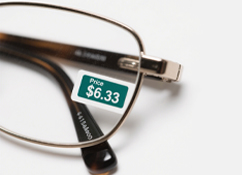Eyeglasses are more than just vision aids—they’re daily essentials for millions. But nothing ruins a good pair faster than seeing your lens coating crack, flake, or “peel” away. If you’ve noticed web-like spiderweb patterns, rough patches, or hazy vision that won’t go away with cleaning, you’re dealing with eyeglass lens coating peeling—a common issue that threatens clarity, comfort, and eye health. Here’s everything you need to know to stop it before it starts.
Eyeglass lenses feature thin, functional coatings (like anti-reflective, scratch-resistant, UV-protective, or blue light-blocking layers) to boost performance. When these layers peel, they crack, flake, or lift away from the lens surface. The telltale signs?
- Web-like patterns visible under light
- Rough, uneven surfaces that feel gritty to the touch
- Hazy vision that cleaning won’t fix
Peeling coatings turn your once-clear lenses into blurry, frustrating obstacles—ruining both function and style.
Lens coating peeling doesn’t happen by accident. Here are the top triggers:
Heat is the #1 culprit. On a hot day, a car’s interior can hit 122–158°F (50–70°C) in minutes—enough to make the coating expand. As the lens cools, rapid contraction creates thermal stress that cracks or lifts the coating. Even everyday heat (stir-fry splatters, hot pot steam, or leaving glasses near a stove) can damage coatings instantly.
Rough handling wears down coatings over time. Rubbing lenses against jeans pockets, scratchy tabletops, or cheap paper towels creates micro-scratches. These tiny damage points weaken the coating’s bond to the lens—until it finally peels away. Even using a rough towel to clean your glasses can scratch the coating!
Not all coatings are created equal. Cheap lenses often use low-grade materials or rushed manufacturing (like “dip-coated” vs. durable “vacuum-deposited” coatings). These weak layers can peel even with normal use—no heat, no scratches required. Always choose lenses with factory-applied, high-quality coatings (ask your optician about AR or scratch-resistant layers).
Chemicals eat away at protective coatings. Household cleaners (bleach, ammonia), cosmetics (mascara, foundation), and even some hand soaps can corrode the layers. If you don’t rinse off residue immediately, it slowly breaks down the coating—leading to peeling. Lab workers or cleaners face extra risk from airborne chemicals.
Peeling coatings aren’t just unsightly—they’re bad for your eyes. The uneven surface disrupts light transmission, causing:
- Blurry or distorted vision
- Glare or double vision
- Constant eye strain (from squinting to see clearly)
- Long-term fatigue (your eyes work harder to compensate for hazy lenses)
Wearing peeling lenses over time can even make your eyes less able to adjust to clear vision. It’s not just about your glasses—it’s about protecting your eye health.
Stopping peeling starts with small, consistent habits. Follow these steps to keep your lenses in top shape:
One-handed moves warp frames and stress lenses, weakening the coating’s bond. Use both hands to put on/take off your glasses—every time.
Never leave glasses on a table, in a bag, or in your pocket. A hard, padded case protects them from crushing, scratching, or heat exposure.
Keep glasses away from hot cars, sunny windowsills, saunas, or stoves. If you cook or work in high-heat areas, choose heat-resistant lenses (polycarbonate or Trivex)—they handle temperature changes without peeling.
- Use a specialized eyeglass cleaner (no household products—they’re too harsh!).
- Wipe with a soft microfiber cloth—never paper towels, tissues, or rough towels (they scratch!).
- Brush off grit/dust first—tiny particles can damage the coating if rubbed in.
Keep glasses away from cosmetics, bleach, and strong cleaners. If something splashes on them, rinse immediately with lukewarm water. For makeup wearers: Put on glasses after applying foundation or mascara to avoid residue.
Eyeglass lens coating peeling is preventable—if you know what to do. By avoiding heat, using the right cleaning tools, and choosing quality lenses, you can extend your glasses’ lifespan, keep your vision clear, and protect your eyes. Remember: Your glasses are an investment in your daily life—treat them like one.
With these tips, you’ll say goodbye to peeling coatings and hello to long-lasting, clear vision. Simple as that!











